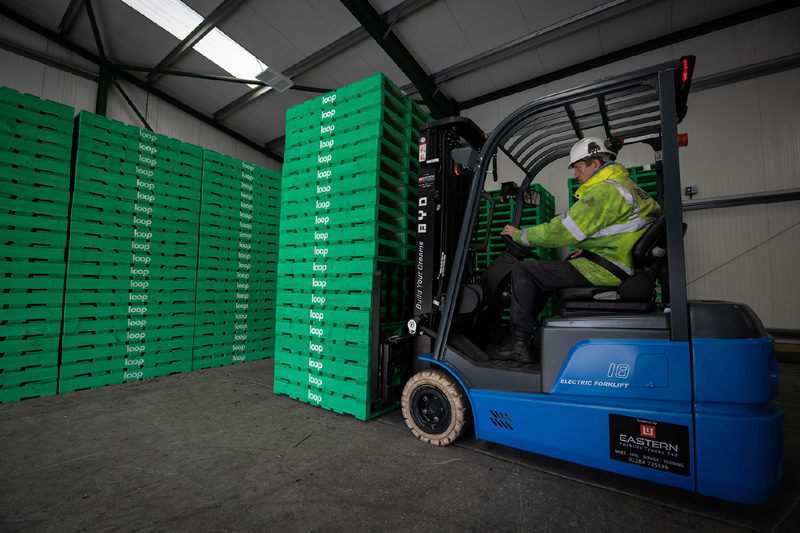
Launched with a claim that it is “set to transform the way building materials are distributed across the UK”, The Pallet Loop is described as the “first circular economy pallet reuse system for the construction sector”. With support from a number of organisations throughout the industry supply chain — including Bradfords, MKM and the BMF from the merchant sector alone — PBM considers how the new service can reduce pallet consumption, cut waste and improve efficiencies.
Around 18 million pallets are manufactured for the UK construction industry each year, with estimates suggesting less than 10% are currently reused. Established to deliver a more sustainable pallet distribution model, The Pallet Loop is aligned with environmental targets set for the sector by UK Government and also reflects the growing desire and need for businesses to adopt ‘circular economy’ practices that are more environmentally friendly.
Founded by what are reportedly some of the biggest names in the UK pallet industry, The Pallet Loop has already been welcomed by a group of high-profile companies in the construction sector — including BAM Construct UK, Bradfords, Lovell and the wider Morgan Sindall Group, MKM, SIG, MSK and Wilmott Dixon — that have signed up to a charter which acknowledges that “change is required” when it comes to pallet consumption, and committing to a comprehensive evaluation of how the service could be integrated within their businesses to help cut waste.
Timetabled for operational roll out in 2022, The Pallet Loop is a joint venture between Paul and Ryan Lewis (formerly HLC Wood Products) and Scott Group — one of the UK’s leading pallet producers. Centred on the principles of ‘recover, repair and reuse’, the initiative aims to eliminate “avoidable pallet waste” in the construction sector by incentivising pallet returns via a cost-effective, easy-to-use, deposit-based system.
“The current industry specification for pallets works on the assumption that they will be scrapped or skipped once they reach their final destination. We’re turning this outdated, inefficient and linear practice on its head.”
Estimates suggest that up to 10% of the construction waste stream is pallets, which is costly from both a financial and an environmental perspective. Its founders therefore contend that widespread adoption of The Pallet Loop across the sector will greatly reduce the burden that pallet production currently places on the environment and our forests whilst “achieving approximately 40% less CO2 emissions and an estimated up to 75% reduction in timber usage” (to create construction industry pallets, an estimated 6,000 acres of forestry are harvested every year, with a further 236,000 acres grown to cater for future demand).
How it works
At the heart of the scheme is a range of distinctive, green, 100% FSC LOOP pallets. Manufactured with durability in mind — they are, on average, twice as strong as existing designs — LOOP pallets will be distributed to building materials manufacturers, which can use them to transport products to builders’ merchants and construction sites nationwide.
The manufacturers will pay a deposit per pallet (along with a separate issue fee that the manufacturer absorbs in much the same way they do today with a packaging charge) to The Pallet Loop. As the pallets move through the supply chain, the deposit will pass from manufacturer to merchant and, if applicable, to end user. Once materials reach their final destination, pallets can be stacked and stored ready for collection by The Pallet Loop, which has a dedicated recovery infrastructure in place including a network of more than 40 collection hubs nationwide and its own vehicles.
Collection is said to be simple, by booking a pick up slot via the telephone or online, and the pallets will be collected from as little as 72 hours later. Deposits are then repaid, in full, to the final user.
Paul Lewis, Founder of The Pallet Loop, said: “As a business we’re committed to reducing the impact on the planet that comes from pallet use in the construction industry supply chain. We aim to sustainably manage and reduce the cost of pallets for our customers — making palletised logistics greener and leaner.
“At present, the vast majority of pallets circulating in the sector are designed for single use. The current industry specification for pallets works on the assumption that they will be scrapped or skipped once they reach their final destination. We’re turning this outdated, inefficient and linear practice on its head. In a step-change for the sector, we’ve developed a range of standardised pallets, engineered to last and to be used again and again.”
Paul continued: “Adoption of The Pallet Loop requires a shift in mindset from ‘deliver, distribute, discard’ to ‘recover, repair and reuse’ — but we’re confident the time is right and that the UK construction industry is ready to embrace this transformational shift towards a circular solution. This is evidenced by the number of companies that have stepped forward to welcome our launch, sign our charter, and investigate how The Pallet Loop might work for them.
“The last eighteen months have challenged us all to adopt new ways of working. Throughout the pandemic, the phrase ‘build back better’ has been widely used and several new initiatives have launched with leading industry players stating their commitment to a clean recovery. The Pallet Loop model is perfectly aligned with that thinking.”
He added: “With world leaders meeting in Glasgow to discuss climate change, we are offering the construction sector a greener pallet solution — with clear sustainability and cost saving benefits — that can support the country as it works towards its ambitions of net zero emissions by 2050.”
Trials of The Pallet Loop recovery service took place in October across the UK with a number of principal contractors whilst the business itself is a member of the UK Green Building Council and the Builders Merchants Federation, and also has Construct Zero Business Champion status from the Construction Leadership Council.
Click here for more information about The Pallet Loop.










